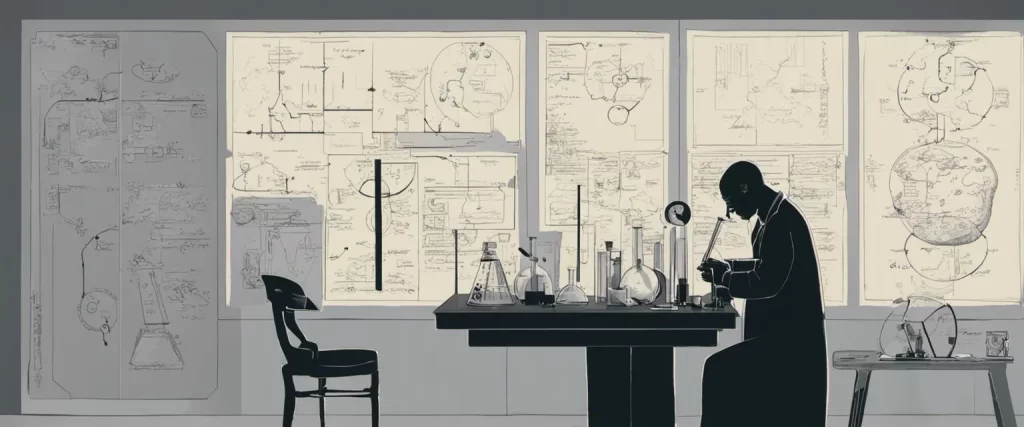
What is Science
Science refers to a systematic and organized study of the natural world in order to understand and explain how it functions. It is based on observation, experimentation, and evidence, and aims to discover and explain the laws and principles that govern the universe. Science involves the formulation of hypotheses, testing them through experiments, analyzing the results, and drawing conclusions based on the data collected. It provides a reliable method to gain knowledge and understand various phenomena, and has led to advancements in various fields such as medicine, technology, and astronomy.
What Can We Get From Science?
We can get numerous benefits from science. Here are some examples:
1. Knowledge and understanding: Science helps us to gather knowledge about the world around us and understand how things work. It allows us to explore the mysteries of the universe, from the vastness of space to the microscopic structures of cells.
2. Technological advancements: Science drives technological progress and innovation. It has led to the development of countless inventions and technologies that have improved our quality of life. From electricity and transportation to computers and medical advancements, science has revolutionized the way we live.
3. Improvements in healthcare: Scientific research has led to significant advancements in medicine and healthcare, resulting in better diagnosis, treatment, and prevention of diseases. Vaccines, antibiotics, surgical techniques, and medical imaging technologies are just a few examples of how science has improved our ability to understand and address health-related issues.
4. Environmental conservation: Science plays a crucial role in understanding and protecting the environment. Through scientific research, we can identify the impact of human activities on the planet, assess the risks of climate change, and develop sustainable solutions to preserve natural resources.
5. Communication and connectivity: Science has enabled the development of various communication technologies, including the internet, mobile phones, and satellites. These advancements have connected people across the globe, facilitating the exchange of information, ideas, and collaboration on a global scale.
6. Food production and agriculture: Scientific research has improved agricultural practices, resulting in increased crop yields and food production. It has also led to the development of genetically modified organisms (GMOs) that can resist pests, diseases, and adverse environmental conditions, ensuring food security for a growing population.
7. Improved transportation and infrastructure: Science has revolutionized transportation systems, making travel faster, safer, and more efficient. From the invention of the wheel to the development of airplanes and high-speed trains, science has transformed the way we move and commute.
8. Energy sources and sustainability: Science is essential in the quest for clean and renewable energy sources. Research in areas such as solar power, wind energy, and nuclear fusion aims to find sustainable alternatives to fossil fuels and reduce greenhouse gas emissions.
Overall, science enriches our lives by enhancing our understanding, improving technology, advancing healthcare, protecting the environment, and providing solutions to various challenges we face as a society.
Strategies in Learning Science
1. Develop a strong foundation: Start by familiarizing yourself with the basics of scientific concepts, theories, and principles. Understand the fundamental concepts before moving on to more complex topics.
2. Active learning: Engage in hands-on activities, experiments, and practical exercises to understand scientific concepts better. This will help reinforce your understanding and make the learning process more enjoyable.
3. Utilize visual aids: Visual aids such as diagrams, flowcharts, and infographics can simplify complex scientific concepts. Use them to summarize information, create study guides, or make flashcards.
4. Practice critical thinking: Science involves analyzing data, drawing conclusions, and solving problems. Practice critical thinking skills by engaging in activities that require observation, analysis, and evaluation of scientific information.
5. Take effective notes: During lectures or while reading textbooks, take organized and concise notes. Summarize key points, concepts, and examples to refer back to later. This helps in retaining information and aids in revision.
6. Collaborate with peers: Engage in group discussions, study groups, or online forums with other students interested in science. This allows for the exchange of ideas, sharing of resources, and learning from each other’s perspectives.
7. Use mnemonic devices: Mnemonic devices are memory aids that help recall information. Use them to remember scientific terms, formulas, or key concepts.
8. Seek clarification: Don’t hesitate to ask questions or seek clarification from your teachers, professors, or classmates when you encounter difficulties. Clear understanding is crucial for effective learning.
9. Apply science to real-life situations: Relate scientific concepts to real-life examples or situations to enhance understanding and relevance. This can help you see the practical applications and implications of what you are learning.
10. Regular practice: Consistency is key to mastering science. Set aside regular study sessions, allocate time for practice exercises, and review previous topics to reinforce learning.

Einstein by Walter Isaacson
Summary
Einstein” by Walter Isaacson is a comprehensive biography that explores the life and achievements of one of the greatest scientific minds in history, Albert Einstein. The book delves into Einstein’s early years, his struggles as a student, his groundbreaking scientific theories, and his personal and political views.
Isaacson begins by delving into Einstein’s unconventional childhood in Germany, where he displayed an early curiosity and fascination with the natural world. He details Einstein’s struggles in school and his rebellion against the rote learning methods of the time.
The biography then follows Einstein’s journey as he enters adulthood, attends university, and embarks on his scientific career. Isaacson examines Einstein’s groundbreaking papers, including his Special Theory of Relativity and his renowned equation, E=mc2. The author provides insights into Einstein’s unique thought processes, his dedication to solving complex problems, and his ability to think outside the box.
Beyond his scientific achievements, the book also explores Einstein’s personal life, including his relationships, marriages, and family dynamics. It delves into his complex personality, his love of music, and his role as a public intellectual.
Isaacson also delves into Einstein’s political views and activism. He examines Einstein’s involvement in pacifism, his advocacy for civil rights, and his efforts to combat the rise of Nazism. The biography highlights Einstein’s passionate belief in humanism and his commitment to social justice.
Overall, “Einstein” offers a well-researched and engaging portrait of Albert Einstein, providing readers with a comprehensive understanding of both the man behind the scientific genius and his significant contributions to our understanding of the universe.
Reasons for Recommendation
1. Comprehensive account of Einstein’s scientific contributions: “Einstein” by Walter Isaacson dives deep into the life and work of Albert Einstein, offering a comprehensive exploration of his groundbreaking scientific theories. The book provides detailed explanations of his groundbreaking theory of relativity, his contribution to quantum theory, and his understanding of the photoelectric effect, among others.
2. Accessibility for both experts and non-experts: Isaacson adeptly conveys complex scientific concepts in a way that is approachable for readers without an extensive scientific background. Whether you are an expert physicist or simply someone interested in science, this book strikes a balance between technicality and clarity, making it accessible and enlightening for a wide range of readers.
3. Insight into the scientific mind: “Einstein” offers an intimate look at the thought process and scientific methodology of one of the greatest minds in history. Isaacson delves into Einstein’s creative thinking, highlighting his unique ability to question established theories, challenge conventional wisdom, and propose innovative hypotheses. Understanding the scientific mindset and Einstein’s approach to problem-solving can be inspiring and instructive for aspiring scientists.
4. Historical context and impact: The book not only explores the scientific concepts developed by Einstein but also places them in the broader historical context. Isaacson provides insights into the socio-political climate in which Einstein’s theories emerged, shedding light on how they were received, debated, and eventually integrated into the scientific community. This historical perspective enriches the reading experience and helps readers appreciate the lasting impact of Einstein’s work.
5. Humanizing the scientist: Isaacson goes beyond the cold facts to delve into Einstein’s personal life, relationships, and struggles. By capturing the human side of Einstein, the book humanizes the iconic figure and enables readers to connect with him on a deeper level. This holistic portrayal enhances the reader’s understanding of the scientist’s motivations, passions, and challenges, allowing for a more nuanced appreciation of his scientific achievements.
6. Inspirational and motivational: “Einstein” provides a motivational narrative that showcases the persistence and determination required to make significant scientific breakthroughs. By presenting Einstein’s relentless pursuit of knowledge and the hurdles he faced along the way, the book offers inspiration for those who aspire to make their mark in the scientific field.
Overall, “Einstein” by Walter Isaacson is a highly recommended book for anyone interested in delving into the life, work, and scientific contributions of one of the greatest scientists of all time. It combines technical explanations with historical context, humanizes the iconic figure, and provides invaluable insight into the scientific mind.

Madame Curie by Ève Curie
Summary
Madame Curie” by Ève Curie is a biographical account of the life and achievements of Marie Curie, a groundbreaking scientist and the first woman to win a Nobel Prize. The book takes readers on a journey through Marie Curie’s remarkable personal and professional life, starting from her childhood in Poland, her struggles to pursue higher education as a woman, her scientific breakthroughs, her partnership with her husband Pierre Curie, and the numerous challenges she faced as a woman in the male-dominated scientific world.
Ève Curie, Marie’s daughter, provides a deeply personal perspective by interweaving her own memories and experiences with detailed research. She explores her mother’s dedication to scientific research, her arduous work in isolating the element radium, and their groundbreaking discoveries in the field of radioactivity. The book also delves into the profound impact these discoveries had on medicine and the subsequent development of radiation therapy for cancer treatment.
Beyond Marie Curie’s scientific endeavors, the book explores her personal life, her relationship with her husband Pierre, the birth and upbringing of their two daughters, and Pierre’s tragic death. Ève Curie captures the essence of her mother’s resilience, determination, and thirst for knowledge, revealing the sacrifices and challenges faced by a woman of exceptional talent in a world dominated by men.
Throughout the book, Ève Curie exhibits a deep admiration and appreciation for Marie’s accomplishments while also acknowledging her flaws and human aspects. The narrative offers an inspiring exploration of the life of an iconic female scientist whose discoveries paved the way for future generations and shattered gender norms in academia and the scientific community.
Overall, “Madame Curie” is a compelling biography that beautifully captures Marie Curie’s extraordinary life and legacy, leaving readers inspired by her groundbreaking contributions to science and her unwavering determination in the face of adversity.
Reasons for Recommendation
1) In-depth introduction to the life and achievements of one of the most prominent female scientists: “Madame Curie” provides a comprehensive overview of Marie Curie’s scientific journey, from her humble beginnings to becoming the first woman to win a Nobel Prize and the only person to win Nobel Prizes in two different scientific fields.
2) Inspiring tale of perseverance and commitment: The book showcases Marie Curie’s unwavering dedication to scientific research, even in the face of personal and societal challenges. Her determination and perseverance serve as an inspiration to scientists, particularly women, who face obstacles in pursuing their passions.
3) Insight into groundbreaking scientific discoveries: The book delves into Marie Curie’s groundbreaking research on radioactivity and the discovery of radium and polonium. It offers a detailed explanation of her experimental methods, scientific breakthroughs, and the overall impact of her discoveries on the field of science.
4) Exploration of the scientific process: “Madame Curie” offers a glimpse into the scientific process, highlighting the meticulous work and years of dedication required to make significant scientific advancements. It provides an excellent case study for aspiring scientists interested in understanding how scientific research is conducted.
5) Historical and cultural context: The book not only explores the scientific achievements of Marie Curie but also provides a historical and cultural context of the time she lived in. It examines the challenges faced by female scientists during that era and sheds light on the gender inequalities prevalent in the scientific community.
6) Exploration of the impact of scientific discoveries: Through Marie Curie’s story, the book emphasizes the profound impact that scientific discoveries can have on society. It explores the uses of radioactivity in medicine, including the development of radiography to diagnose and treat diseases, thus demonstrating the real-world applications of scientific research.
7) Celebration of women in science: By highlighting Marie Curie’s contributions, “Madame Curie” celebrates women in science and serves as a reminder of the valuable role that women have played and continue to play in scientific advancements. It encourages young women with scientific aspirations to pursue their dreams, despite societal barriers.
Overall, “Madame Curie” offers a captivating and well-rounded account of Marie Curie’s life, serving as a testament to the power of scientific curiosity, rigor, and dedication.
Freud by Peter Gay
Summary
Freud: A Life for Our Time” by Peter Gay is a comprehensive biography of Sigmund Freud, the Austrian neurologist who revolutionized the field of psychology. Through meticulous research and detailed analysis of Freud’s personal and professional life, Gay explores the complexities of the man behind the psychoanalytic theories that have had a lasting impact on our understanding of the human mind.
The book delves into Freud’s early years, his upbringing in a middle-class Jewish family, and his fascination with the mind from a young age. Gay explores how Freud’s studies in medicine and neurology, combined with his observations of patients suffering from mental illnesses, led him to develop groundbreaking theories on the unconscious mind, dream analysis, and the interpretation of human behavior.
While highlighting Freud’s contributions to the development of psychoanalysis, Gay also explores the controversies surrounding his work. The book delves into Freud’s relationships with colleagues, friends, and family members, shedding light on both the support and criticism he faced throughout his career. Additionally, Gay delves into Freud’s own struggles with personal and mental health issues, offering insight into how these experiences influenced his theories and practices.
Throughout the biography, Peter Gay presents a balanced view of Freud, acknowledging his brilliance as well as his limitations. While recognizing the lasting impact of Freud’s work, the book also highlights the criticisms and challenges that have emerged in the field of psychology since Freud’s time.
Overall, “Freud: A Life for Our Time” provides readers with a deep understanding of Sigmund Freud’s life, work, and legacy, ultimately showcasing the complexities of one of the most influential figures in the history of psychology.
Reasons for Recommendation
1. Thorough exploration of Freud’s scientific methods: Peter Gay provides a comprehensive examination of Sigmund Freud’s scientific approach to the study of the human mind. He offers a detailed analysis of Freud’s research methods, including his use of case studies and interpretation of dreams, allowing readers to gain insight into how Freud constructed his theories.
2. Balancing scientific evidence with critical analysis: In “Freud,” Peter Gay systematically presents the scientific evidence that supported Freud’s theories, while also critically evaluating their limitations and potential biases. This balanced perspective enables readers to have a more nuanced understanding of Freud’s contributions to psychology.
3. Contextualizing Freud within the scientific community: Peter Gay situates Freud’s work in the broader context of the scientific community during his time. By examining the debates and discussions surrounding Freud’s ideas, readers can appreciate the impact and controversy his theories generated, as well as how they influenced subsequent scientific discussions.
4. Integration of scientific advancements and criticisms: “Freud” by Peter Gay incorporates subsequent scientific advancements and criticisms of Freudian theory as they emerged over the years. This allows readers to grasp the evolution of Freud’s ideas and their relevance to contemporary scientific discourse.
5. Clear and accessible writing style: Peter Gay’s writing style makes complex scientific concepts and psychological theories comprehensible to a wider audience. Through his lucid explanations, readers without extensive scientific backgrounds can follow and engage with the scientific aspects of Freud’s work.
6. Presentation of alternative viewpoints: Throughout the book, Peter Gay acknowledges alternative viewpoints and challenges to Freudian theory within the scientific community. By considering differing perspectives, readers gain a more complete understanding of the scientific debates surrounding Freud’s work.
7. Exploration of Freud’s influence on subsequent scientific developments: Peter Gay delves into the lasting impact Freud had on modern psychology, psychiatry, and psychoanalysis. By tracing the influence of his ideas on fields such as neurobiology, cognitive psychology, and psychotherapy, readers can appreciate Freud’s significance within the broader scientific landscape.
8. Examination of the strengths and limitations of Freud’s theories: Peter Gay critically assesses the strengths and weaknesses of Freud’s theories from a scientific perspective. This allows readers to form their own informed opinions about the validity and applicability of Freudian concepts based on the evidence presented.
In summary, “Freud” by Peter Gay is recommended for its comprehensive exploration of Freud’s scientific methods, balanced analysis of his theories, contextualization within the scientific community, integration of advancements and criticisms, accessible writing style, presentation of alternative viewpoints, examination of his influence on subsequent developments, and evaluation of strengths and limitations.
Pingback: Lost in Choices? Let Book Recommendations Guide Your Decision-Making - Paidread
Pingback: Unlocking the Mysteries of the Universe: Essential Books on Cosmo - Paidread
Pingback: Discover the Wonders of the Cosmos: Book Recommendations for Astronomy Lovers - Paidread
Pingback: Enhancing Decision-Making Skills: Top 3 Books to Read Now - Paidread